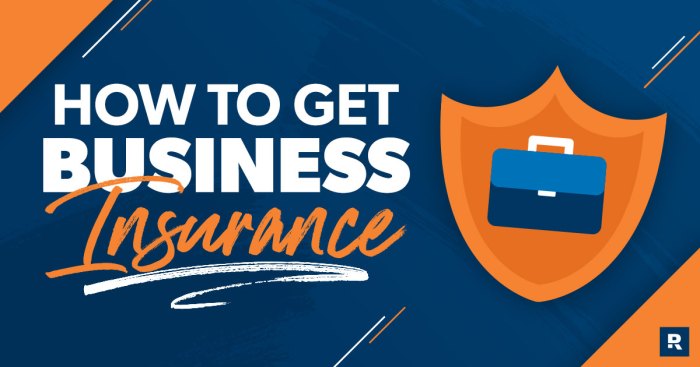Get business insurance today to safeguard your enterprise from unforeseen circumstances. Protecting your business is crucial, and timely insurance coverage can provide peace of mind. This guide explores the various types of insurance, the importance of immediate action, and the steps to secure the right policy for your specific needs.
Understanding the different types of business insurance, from general liability to property coverage and workers’ compensation, is essential. This document provides a comprehensive overview of the available options, highlighting their benefits and drawbacks to help you make informed decisions. We’ll also Artikel the process of obtaining insurance, including finding reputable providers and navigating the timeline involved.
Understanding the Target Audience
A business owner actively searching for “get business insurance today” likely faces a pressing need for immediate coverage. This urgency suggests a variety of potential situations and business types, all demanding swift action to protect their operations. Understanding the nuances of this target audience is key to effectively marketing insurance solutions.Businesses experiencing sudden challenges or changes often seek immediate insurance solutions.
This could include everything from a new business owner needing liability protection to an established business dealing with a critical incident or potential legal risk. The need for speed highlights the importance of accessibility and ease of purchase for this group.
Typical Business Owner Profile
The typical business owner searching for “get business insurance today” is likely a proactive individual focused on mitigating risk. They are aware of the importance of insurance but might be overwhelmed by the complexities of the process. This individual may be a small business owner, a sole proprietor, or a manager of a rapidly growing enterprise. Their level of experience in insurance matters can vary greatly, from completely new to the subject to those with basic knowledge but needing a quick solution.
Their primary concern is protecting their business assets and ensuring financial stability.
Specific Needs and Pain Points
These business owners often experience a pressing need for insurance due to various factors. A common pain point is the perceived complexity of the insurance buying process. They may be unsure of which types of coverage are necessary, and the availability of affordable options. Furthermore, the pressure of immediate needs might lead to a lack of time to thoroughly research different policies and providers.
They might feel overwhelmed by the many variables, from deductibles to policy limits. They might also be uncertain about the implications of various coverage options and how they impact their business.
Different Types of Businesses
Businesses seeking immediate insurance coverage encompass a broad range of industries and sizes. This could include start-ups facing potential liability issues, restaurants needing food service liability insurance, construction companies needing general liability insurance, or e-commerce stores requiring product liability coverage. Each type of business faces unique risks and requires a tailored approach to insurance. The speed of the search highlights the critical nature of the need for protection.
Motivations Behind Immediate Coverage
The desire for immediate insurance coverage is often driven by an imminent need to protect the business. This could include a sudden increase in risk, such as a new product launch with potential liability concerns, or a significant event like a natural disaster that threatens their physical assets. In other cases, it might be a regulatory requirement or a legal obligation to have specific coverage.
These factors underscore the critical importance of having readily available options for insurance.
Hypothetical Persona
“Sarah,” a 30-year-old sole proprietor running a small, rapidly expanding online clothing boutique, “Threads & Trends.” She’s just launched a new line of eco-friendly apparel and is overwhelmed by the potential for product liability claims. She needs general liability, product liability, and potentially professional liability insurance. Sarah is looking for a straightforward, quick process to secure the necessary coverage, as her business’s rapid growth necessitates immediate protection.
She’s familiar with the basics of insurance but needs an easy-to-understand quote process and quick turnaround time.
Types of Business Insurance

Source: suntrics.com
Protecting your business from unforeseen events is crucial for its long-term success. Understanding the various types of insurance available can help you make informed decisions about safeguarding your assets and operations. Different policies cater to different risks, so a comprehensive approach is essential.
General Liability Insurance
General liability insurance protects your business from claims arising from accidents or injuries that occur on your premises or as a result of your business activities. This is a fundamental coverage for most businesses. It typically covers bodily injury and property damage claims.
- Coverage for Bodily Injury: This component of general liability insurance compensates individuals injured on your property or as a direct result of your business operations. This can include accidents involving customers, employees, or even third parties. Examples include a customer slipping and falling in your store or a delivery driver being injured due to a faulty product your business manufactures.
- Coverage for Property Damage: This aspect of general liability covers damage to the property of others resulting from your business activities. For instance, if a delivery truck crashes into a storefront due to a defect in your product, this coverage would assist in settling the damages.
Property Insurance
Property insurance protects your business’s physical assets, such as buildings, equipment, and inventory. It safeguards against losses due to perils like fire, theft, vandalism, and natural disasters. The specific coverage options vary based on the policy and the nature of the business.
- Coverage for Buildings: This component ensures financial support in the event of damage or destruction to your business premises due to covered events. This includes repairs or rebuilding costs if a fire damages your building.
- Coverage for Contents: This portion of the policy safeguards the contents within your business premises. This includes equipment, inventory, and other items that are essential for your operations. If a flood damages your stock of finished goods, this aspect would cover the losses.
Workers’ Compensation Insurance
Workers’ compensation insurance is mandatory in many jurisdictions and provides benefits to employees injured on the job. This protects both the employee and the business, ensuring financial support for medical expenses and lost wages.
- Medical Expenses: This component of the policy covers the medical expenses of employees injured on the job, including doctor visits, hospital stays, and rehabilitation.
- Lost Wages: Workers’ compensation can provide partial or full wage replacement to employees who are unable to work due to job-related injuries. This is a critical aspect to maintain employee morale and minimize disruption to the business.
Comparison Table of Common Insurance Policies
| Policy Type | Key Features | Benefits |
|---|---|---|
| General Liability | Covers bodily injury and property damage claims arising from business operations. | Protects against lawsuits and claims related to accidents and injuries. |
| Property Insurance | Covers damage or loss to business property due to various perils. | Ensures business continuity by protecting physical assets and their contents. |
| Workers’ Compensation | Provides benefits to employees injured on the job. | Complies with legal requirements and provides support to injured employees, minimizing legal liabilities. |
Urgency and Time Sensitivity

Source: ramseysolutions.net
Securing business insurance promptly is vital for mitigating risks and safeguarding your financial well-being. A proactive approach to insurance can prevent significant financial losses and operational disruptions. Understanding the urgency surrounding insurance procurement can help businesses make informed decisions and protect their future.Procrastination in securing business insurance can expose your company to substantial financial and operational vulnerabilities. Timely acquisition of insurance policies is essential for maintaining business continuity and financial stability.
Reasons for Immediate Insurance Needs
Understanding the circumstances necessitating immediate insurance procurement is crucial for businesses to make timely decisions. Various situations necessitate immediate insurance coverage. These circumstances include unforeseen events that pose imminent threats to the business.
- Sudden Property Damage or Theft:
- Liability Claims:
- New Business Ventures or Expansions:
- Changes in Business Operations:
A fire, flood, or theft incident can cause immediate and substantial damage to a business’s physical assets, disrupting operations and requiring immediate financial support. Without insurance, the business may face insurmountable financial challenges in recovering from such events. The swift action of acquiring insurance policies helps businesses recover more efficiently from such incidents.
A lawsuit or claim against the business for damages caused by negligence or an incident may arise suddenly. Insurance is vital for covering potential legal fees and settlements. Delaying insurance can lead to significant financial liabilities, as the business is exposed to potentially high costs in defending the claims. Swift acquisition of insurance can minimize the risk and financial burden associated with liability claims.
New business ventures or expansions often involve increased risk. Immediate insurance coverage is crucial for protecting the investment and ensuring that the business can withstand potential financial losses associated with these expansions. Without proper insurance, the business may be unable to operate during periods of high risk. Securing insurance immediately can ensure that the business is well-protected and can handle unforeseen circumstances.
Changes in business operations, such as a relocation, or introduction of new equipment, may require updated insurance coverage. Failing to update insurance coverage immediately can expose the business to significant risks. Acquiring insurance policies immediately helps ensure that the business remains adequately protected as its operations change.
Potential Risks of Delaying Insurance
Delaying the procurement of insurance can expose a business to several substantial risks. Understanding these potential pitfalls is crucial for making informed decisions.
- Unforeseen Events:
- Financial Losses:
- Legal and Regulatory Issues:
- Damage to Reputation:
A delay in acquiring insurance leaves the business vulnerable to unforeseen events. These events could cause substantial financial losses, impacting the business’s ability to operate and recover. Insurance provides a financial safety net against such events. Prompt insurance procurement minimizes the impact of unforeseen events.
Without insurance, businesses face potential financial losses due to damages, claims, or liabilities. These losses can severely impact the business’s financial stability. The risks are minimized by acquiring insurance promptly.
Certain jurisdictions may require specific insurance policies for businesses. Delaying procurement may result in legal or regulatory penalties. Compliance with legal requirements can be ensured by acquiring insurance immediately.
Delaying insurance procurement may signal a lack of preparedness, impacting the business’s reputation and potentially deterring customers or investors. The business can protect its reputation by obtaining insurance promptly.
Consequences of Not Having Insurance
The absence of insurance can have significant repercussions for businesses. Understanding these consequences is essential for timely procurement.
- Financial Instability:
- Operational Disruptions:
- Legal Ramifications:
Lack of insurance can lead to significant financial instability, as the business is exposed to potential losses. The absence of insurance coverage can lead to the business being unable to meet its financial obligations. Having insurance coverage can provide financial stability during challenging times.
Unforeseen events, such as property damage or lawsuits, can disrupt business operations. Without insurance, the business may struggle to recover from these disruptions, potentially leading to significant operational challenges. Insurance can help minimize operational disruptions by providing financial resources for recovery.
In certain situations, businesses might face legal ramifications if they lack appropriate insurance coverage. The absence of insurance can result in legal disputes and penalties. Insurance can mitigate the legal risks associated with business operations.
Insurance Acquisition Process
Securing the right business insurance is a crucial step in safeguarding your operations and financial well-being. This process, while potentially complex, can be navigated effectively with a clear understanding of the steps involved and a proactive approach. Understanding the specific needs of your business is paramount to choosing the appropriate coverage.The insurance acquisition process typically involves several key steps, from initial assessment to policy issuance and ongoing management.
A thorough understanding of these steps can help streamline the process and ensure you obtain the best possible coverage for your specific business needs.
Steps Involved in Obtaining Business Insurance
This section Artikels the common steps involved in acquiring business insurance. These steps are generally followed, although the order and specific details may vary depending on the insurance provider and your individual business circumstances.
- Needs Assessment and Policy Selection: Thoroughly evaluating your business’s unique risks and liabilities is critical. This involves considering factors like the type of business, location, industry, assets, and potential exposures. A comprehensive assessment will help determine the most suitable insurance policies, including general liability, property insurance, and potentially others, such as professional liability or workers’ compensation, depending on the nature of your business.
For example, a retail store will have different insurance needs than a construction company.
- Gathering Information and Documents: Insurance providers require specific information to assess your risk profile and determine appropriate premiums. This includes details about your business operations, financial data, and any relevant licenses or permits. Providing accurate and complete information is essential for a smooth process. This might include business structure, revenue, and historical claims data, if applicable.
- Applying for Coverage: After gathering the required information, you will complete an application form, often online or through a dedicated portal. This application typically includes details about your business, desired coverage, and contact information. Accurate and timely submission of the application is vital for a swift processing time.
- Underwriting and Risk Assessment: Insurance providers conduct an underwriting process to evaluate your risk profile. This involves scrutinizing the information provided in the application and considering factors such as your business history, financial standing, and potential liabilities. The assessment helps determine the appropriate premium rates and coverage limits.
- Policy Issuance and Review: Once the underwriting process is complete, you will receive a policy document outlining the terms and conditions of your coverage. Carefully reviewing this document is crucial to understand your rights and responsibilities. Ensure you understand all the terms and conditions before signing the policy.
- Policy Management and Renewal: Managing your policy throughout its duration is vital. This includes reporting any changes to your business or circumstances that might affect your coverage. Understanding your renewal process and the required information for timely renewals is also essential. Regularly reviewing your policy for any changes or updates is crucial.
Typical Timeline for the Process
The timeline for obtaining business insurance can vary depending on the complexity of your needs and the insurance provider. Generally, the process can take anywhere from a few days to several weeks. For example, a straightforward application for basic coverage could be finalized within a week, while more complex situations might require several weeks for comprehensive assessments.
Common Questions Business Owners Might Have
- What are the typical costs of business insurance? The cost of business insurance varies significantly based on factors such as the type of business, location, and coverage requirements. Factors like industry, claims history, and revenue also influence premiums.
- How do I choose the right insurance provider? Reputable providers often have extensive experience, strong financial stability, and a good track record of claims handling. Researching and comparing providers is crucial to finding the best fit for your business. Consider factors like customer reviews, financial strength ratings, and policy offerings.
- What should I do if I have a claim? Understanding the claim process is essential. Contact your insurance provider immediately to report any claim. Document the incident and provide all required information as requested.
Finding Reputable Insurance Providers
- Online Research and Comparison: Numerous online resources allow you to compare insurance quotes and find providers. Using online tools and platforms can help you quickly assess different providers.
- Professional Recommendations: Seeking recommendations from trusted advisors, industry peers, or business mentors can provide valuable insights into reputable insurance providers.
- Insurance Brokerage Services: Working with a qualified insurance broker can provide expert guidance in finding suitable coverage tailored to your specific business needs. A broker can act as a trusted advisor and guide you through the process.
Flowchart of the Process
[A visual flowchart outlining the process would be beneficial here, but I am unable to create images.]
Value Proposition and Benefits

Source: insuranceblogbychris.com
Protecting your business from unforeseen circumstances is crucial for long-term success. Immediate business insurance provides a vital safety net, safeguarding your financial well-being and operational continuity. Proactive planning, rather than reactive crisis management, is key to maintaining a healthy and sustainable business.Securing business insurance promptly offers substantial advantages, from mitigating potential financial losses to ensuring operational stability. Understanding these benefits empowers you to make informed decisions that protect your business investments and future.
Immediate Protection Against Financial Losses
Prompt insurance acquisition shields your business from a range of potential financial setbacks. Unexpected events like property damage, liability claims, or natural disasters can lead to significant financial losses. Insurance acts as a critical buffer, absorbing these costs and helping your business recover. For example, a sudden fire destroying a factory’s equipment can be devastating. However, insurance coverage can help replace the damaged equipment, enabling the business to resume operations more quickly and limit the financial impact.
Likewise, a client lawsuit or product liability claim can result in substantial legal fees and settlements. Insurance provides the financial resources to manage such situations effectively.
Operational Continuity and Stability
Business insurance plays a vital role in maintaining operational continuity. Disruptions, whether caused by unforeseen events or legal proceedings, can severely impact a business’s ability to function smoothly. Insurance provides the necessary financial resources to navigate these challenges, ensuring business operations continue uninterrupted. For instance, a sudden illness or injury to a key employee can lead to production delays and reduced revenue.
Insurance, through disability or workers’ compensation, can help cover lost income and ensure business operations continue without major disruptions.
Long-Term Financial Advantages
Securing business insurance immediately can yield substantial long-term financial benefits. By proactively addressing potential risks, you reduce the likelihood of costly disruptions and protect your business’s financial health. Insurance can also enhance your business’s reputation and credibility. A business known for its preparedness and proactive risk management tends to attract more investors and customers, fostering long-term financial growth.
For example, a company with robust liability insurance is less likely to face a crisis caused by a costly lawsuit, thereby preserving its financial stability and long-term viability.
Protection Against Potential Liabilities
Business insurance safeguards your business against potential liabilities. Accidents, injuries, or property damage can result in legal claims and financial burdens. Comprehensive insurance policies cover these risks, minimizing your financial exposure. Insurance coverage can provide protection against lawsuits arising from product defects, negligence, or other incidents. Moreover, adequate insurance can help manage the legal expenses associated with defending against such claims.
Insurance also reduces the potential for business interruption and the associated revenue loss.
Call to Action and Next Steps

Source: fitsmallbusiness.com
Protecting your business is crucial. Taking proactive steps to secure your financial future through appropriate insurance is a smart business decision. This section Artikels how to initiate the process and access valuable resources.Understanding the next steps is key to finding the right insurance coverage for your business. This includes exploring different options, comparing quotes, and directly contacting providers to get tailored advice.
Compelling Call to Action
A strong call to action encourages potential customers to take the next step in securing their business. A clear and concise message, highlighting the benefits of insurance, motivates action. For example, a statement like “Protect your business today with tailored insurance solutions” can be more effective than a general statement. Highlighting the time-sensitive nature of business insurance can also increase urgency.
Resources for Finding Quotes
Numerous resources are available to obtain insurance quotes. These include online comparison tools, direct provider websites, and independent insurance agents. Comparing quotes from multiple providers is vital for securing the best possible coverage.
- Online comparison tools provide a streamlined process for evaluating different insurance options. These tools often gather data from multiple providers, allowing for quick comparisons based on specific criteria. For example, you might specify the type of business and desired coverage levels to receive tailored recommendations.
- Direct provider websites offer detailed information about specific policies and often allow for online quote requests. Many providers offer extensive information on their websites to help potential customers understand different policies.
- Independent insurance agents are valuable resources for personalized advice. They can help you navigate the complexities of insurance policies and find the best fit for your specific business needs. This is particularly helpful for businesses with unique or complex insurance requirements.
Contacting Insurance Providers Directly
Directly contacting insurance providers can provide personalized advice and a deeper understanding of policy specifics. This approach allows for questions about specific coverage details.
- Many insurance providers have dedicated phone lines and online contact forms for inquiries. This is a good way to ask specific questions and receive personalized guidance.
- Utilizing these direct channels enables clarification of particular clauses or exclusions in the policy. This ensures that the coverage aligns with your business’s unique risks.
Insurance Comparison Tools
Insurance comparison tools facilitate a streamlined comparison of various policies. These tools often aggregate quotes from different providers, allowing for an objective assessment. This is particularly useful for finding policies that fit specific criteria and budget.
- Independent comparison tools provide a platform for evaluating policies across different insurers. This approach helps to identify the best-suited policy options for the specific needs of a business.
- These tools typically consider factors like coverage limits, premiums, and policy terms to offer customized recommendations. These comparisons can be especially useful for businesses that require extensive coverage.
Reputable Insurance Providers, Get business insurance today
Selecting reputable insurance providers is crucial for ensuring reliable coverage. A table below showcases some providers, their specialties, and contact information. This information is for general knowledge and does not constitute financial advice.
| Insurance Provider | Specialization | Contact Information |
|---|---|---|
| Company A | Commercial property and liability | www.companyA.com |
| Company B | General liability and workers’ compensation | www.companyB.com |
| Company C | Professional liability and business interruption | www.companyC.com |
Insurance Provider Comparison

Source: nextdoor.com
Shopping around for business insurance is crucial for securing the best possible coverage at the most competitive price. Understanding the different providers and their offerings empowers you to make an informed decision that aligns with your specific business needs. A comprehensive comparison process will help you avoid overpaying and ensure you have adequate protection.
Importance of Comparing Providers
Comparing insurance providers is essential for securing the most favorable terms. Different companies offer varying policies, premiums, and coverage options. A comparison allows you to identify providers with tailored solutions that meet your business’s unique risks and requirements. By comparing multiple quotes, you can significantly reduce your insurance costs while maintaining comprehensive protection.
Factors to Consider When Comparing Providers
Several factors play a crucial role in the insurance provider comparison process. Evaluating these factors is essential for identifying the ideal provider for your business.
- Coverage Options: Different providers offer varying coverage options. Consider the specific risks your business faces, and ensure the provider’s policies address these risks adequately. For instance, a retail business might prioritize coverage for theft and property damage, while a manufacturing business might require coverage for liability in case of accidents or equipment malfunctions.
- Pricing and Premiums: Insurance premiums can vary significantly between providers. Analyze the premiums offered by different providers while maintaining the same coverage options. This will allow you to determine the most affordable option without compromising essential protection.
- Customer Service and Reputation: A reputable insurance provider with a strong customer service record can provide invaluable support when you need it. Review customer reviews and testimonials to gauge the company’s reliability and responsiveness. This is particularly important in case of claims or disputes.
- Financial Stability: A financially stable insurance company is crucial to ensure that claims will be honored. Research the company’s financial standing and its claims-paying history. Assess the company’s solvency and its ability to meet its obligations.
Finding Multiple Quotes from Different Providers
Obtaining multiple quotes from different insurance providers is a critical step in the comparison process. This allows for a direct and objective assessment of pricing and coverage options.
- Online Insurance Comparison Tools: Many online platforms allow you to input your business details and receive quotes from multiple providers simultaneously. These tools streamline the process and provide a clear overview of available options.
- Direct Contact with Insurance Agents: Contacting insurance agents directly can provide tailored advice and assistance in finding appropriate quotes. This approach can offer customized solutions that address specific needs.
- Requesting Quotes from Different Providers: Directly contacting insurance providers through their websites or phone numbers to request quotes can also provide valuable insight. This method allows you to explore specific policies and coverage options.
Comparing Coverage Options and Pricing
Once you have collected multiple quotes, carefully compare the coverage options and pricing. This requires a meticulous examination of policy details.
- Coverage Limits: Understand the limits of coverage offered by different providers. Ensure that the limits adequately protect your business against potential losses. For example, a restaurant may need higher liability limits than a small office.
- Deductibles: Analyze the deductibles associated with different policies. Lower deductibles often result in higher premiums. Evaluate the trade-off between premium costs and potential out-of-pocket expenses in case of a claim.
- Policy Exclusions: Carefully review policy exclusions to understand the limitations of coverage. Ensure that the exclusions do not compromise essential protection for your business. Compare the exclusions between different providers to identify any significant differences.
Insurance Provider Comparison Table
The following table provides a sample comparison of insurance providers. This is a simplified example, and specific details should be verified with the providers directly.
| Insurance Provider | Premium (Annual) | Coverage Limit (Liability) | Deductible | Customer Service Rating |
|---|---|---|---|---|
| Company A | $5,000 | $1,000,000 | $500 | 4.5 stars |
| Company B | $4,500 | $1,000,000 | $1,000 | 4.0 stars |
| Company C | $5,500 | $2,000,000 | $500 | 4.8 stars |
Final Summary
In conclusion, securing business insurance today is a proactive step toward mitigating potential risks and ensuring your business’s long-term viability. By understanding the types of insurance available, the urgency of immediate coverage, and the process of acquisition, you can confidently protect your investment. This guide serves as a resource for making informed decisions about your insurance needs, empowering you to make the right choices for your business.
Popular Questions: Get Business Insurance Today
What are the common reasons businesses need immediate insurance?
Businesses might need immediate insurance due to impending expansion, new equipment purchases, or upcoming projects that expose them to higher risks. Other reasons include contractual obligations, seasonal peaks in activity, or sudden changes in the business environment.
How long does the insurance acquisition process typically take?
The timeline for obtaining business insurance varies depending on the type of policy and the complexity of the application. Simple policies might take a few days, while more complex ones could take several weeks.
What are some key factors to consider when comparing insurance providers?
Key factors include pricing, coverage details, customer service reviews, and the provider’s reputation. You should also consider their experience in serving businesses like yours.
What are the potential risks of delaying insurance procurement?
Delaying insurance can expose your business to significant financial losses due to unforeseen incidents or legal liabilities. It could also impact your business’s reputation and ability to secure future contracts.
